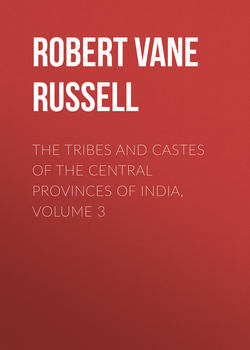Читать книгу The Tribes and Castes of the Central Provinces of India, Volume 3 - Robert Vane Russell - Страница 33
Gond
(c) Marriage Customs
15. Prohibitions on intermarriage, and unions of relations
ОглавлениеA man must not marry in his own sept, nor in one which worships the same number of gods, in localities where the classification of septs according to the number of gods worshipped obtains. Intermarriage between septs which are bhaiband or brothers to each other is also prohibited. The marriage of first cousins is considered especially suitable. Formerly, perhaps, the match between a brother’s daughter and sister’s son was most common; this is held to be a survival of the matriarchate, when a man’s sister’s son was his heir. But the reason has now been generally forgotten, and the union of a brother’s son to a sister’s daughter has also become customary, while, as girls are scarce and have to be paid for, it is the boy’s father who puts forward his claim. Thus in Mandla and Bastar a man thinks he has a right to his sister’s daughter for his son on the ground that his family has given a girl to her husband’s family, and therefore they should give one back. This match is known as Dūdh lautāna or bringing back the milk; and if the sister’s daughter marries any one else her maternal uncle sometimes claims what is known as ‘milk money,’ which may be a sum of Rs. 5, in compensation for the loss of the girl as a wife for his son. This custom has perhaps developed out of the former match in changed conditions of society, when the original relation between a brother and his sister’s son has been forgotten and girls have become valuable. But it is said that the dūdh or milk money is also payable if a brother refuses to give his daughter to his sister’s son. In Mandla a man claims his sister’s daughter for his son and sometimes even the daughter of a cousin, and considers that he has a legitimate grievance if the girl is married to somebody else. Frequently, if he has reason to apprehend this, he invites the girl to his house for some ceremony or festival, and there marries her to his son without the consent of her parents. As this usually constitutes the offence of kidnapping under the Penal Code, a crop of criminal cases results, but the procedure of arrest without warrant and the severe punishment imposed by the Code are somewhat unsuitable for a case of this kind, which, according to Gond ideas, is rather in the nature of a civil wrong, and a sufficient penalty would often be the payment of an adequate compensation or bride-price for the girl. The children of two sisters cannot, it is said, be married, and a man cannot marry his wife’s elder sister, any aunt or niece, nor his mother-in-law or her sister. But marriage is not prohibited between grandparents and grandchildren. If an old man marries a young wife and dies, his grandson will marry her if she is of proper age. In this there would be no blood-relationship, but it is doubtful whether even the existence of such relationship would prevent the match. It is said that even among Hindu castes the grandfather will flirt with his granddaughter, and call her his wife in jest, and the grandmother with her grandson. In Bastar a man can marry his daughter’s daughter or maternal grandfather’s or grandmother’s sister. He could not marry his son’s daughter or paternal grandfather’s sister, because they belong to the same sept as himself.
